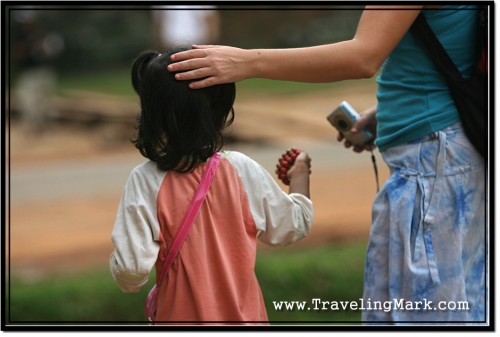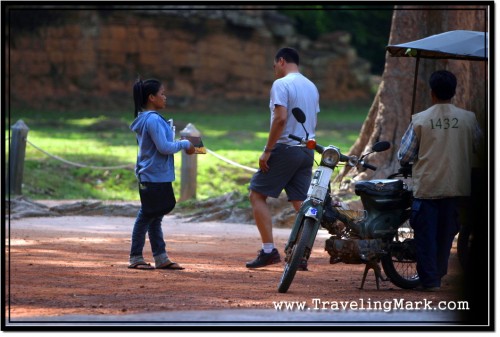While I was chatting it away at Banteay Kdei temple as part of my break from the sun, something happened that made me break my #1 rule of not supporting the culture of handouts. Saly, Sarein and Kai kept sharing stories of the village life with me when loudish, argument like screaming came out of the temple gate and one little girl walked out of there in tears.
I’ve had many children approach me with fake tears during the course of my stay in Cambodia, but this one was different. This girl was not faking it to trick anyone into giving her money, this girl was sincerely hurting. Everyone, including Saly, Sarein and Kai as well as everyone else who was around completely ignored the child as if it was nobody else’s, but her own business to get over it.
I was appalled and wanted to at least know the reason why she was crying so I could attempt to make her feel better. Everybody was telling me that it was nothing and that she’d be over it right away but I wanted her to tell me what it was that made her cry so much. Through endless sobbing, she eventually let me know that one of the other child slaves managed to make a foreigner buy postcards from her, a foreigner whom, as she said, she was the first to talk to.
Child slaves who are summoned by their parents to bother tourists at Angkor Temples are instructed to say certain things that are proven to maximize their chances of selling. Because foreigners are accosted on every step of their way at Angkor, they impulsively reject every attempt at being sold something as they would have had a million and one chances to buy the same stuff from hundreds of previous touts they were jumped by along the way so far, if they had any intention to own any of the junk.

Common responses to impulsive rejection include the “Where Are You From?” question the purpose of which is to get the foreigner engaged in a conversation so they eventually feel connection with the tout and agree to buying something because of that. If that fails and there is no stopping the foreigner from exiting the territory in which the touts is allowed to operate, the touts will utilize the last resort phrase by saying something like: “I’ll wait for you on your way back, OK? When you come back you buy from me!”
This is obviously what the heartbroken girl told the tourist as he was walking inside the temple where she was not allowed to harass anyone, but then when he was walking outside and already had his set of postcards purchased from some other tout, she felt betrayed by whoever the successful tout was and that made her cry and get in an argument with that other girl.
It felt as though the sale of that pack of postcards was a “must happen” for her that day. Perhaps she was threatened by her parents who control her that if she doesn’t sell anything today, she would not get anything to eat or worse. Why otherwise would a 7 year old girl cry like that over an unsuccessful sale? Whatever the reason, it didn’t matter to me at the time. I was right there and at that very moment there was one devastated little girl who was this close to making one sale but someone else ended up with the score.
Sadly, Cambodians draw great pleasure from other people’s suffering. Nothing makes them happier than seeing someone else get in a tight spot. Everyone around, especially the other little girl touts were laughing their asses off and so were the rest of the locals who were nearby. I found this behaviour absolutely atrocious and because there is no stopping of Cambodians who have themselves a good time because they see someone else suffer, I told the girl to follow me so I could withdraw her from this abuse and mockery.
I walked with her across the road where shops are lined up and told her that I would buy that pack of postcards from her. I had no need for any of her postcards – as a matter of fact, I could not possibly consider buying anything as when you are on the road for a long time, wasting money on useless junk is not a smart option but most of all – there is only so much room you have in your backpack and even if you stick with mere necessities, hauling it around on your back over and over will make you understand that you’re not gonna add to it unless it’s really important.
There was absolutely nothing any of the relentless touts could possibly say to make me buy anything from them. Yet in this very moment, all of my personal reasons and beliefs dwindled aside and gave way to making the difference in a life of one single person. The pack of 10 postcards she was trying to sell was of absolutely no use to me. But the one dollar she would make would mean everything to her.
Unfortunately, I didn’t have any one dollar bills on me so I took a five dollar bill to Saly and asked her if she could break it for me so I can buy the postcards from that little girl. And Saly did exactly what I should have expected – she took my money and came back with two one dollar bills and a Bayon t-shirt she said was worth $3 and I had just bought it. Well damn!
The premise of not buying anything you don’t need when you’re on the road is a big one. If I were to buy a t-shirt from every place I visit, I’d quickly need another backpack. This was simply not an option. I had just enough t-shirts to get by and the only way I’d buy a new one would be if I needed to replace one I had worn out. I wash my clothes by hand and wear them in all imaginable situations, including crazy adventures so when a piece of garment wears out, then I’ll buy a new one – to replace it, but not until there is such need.
Saly made a decision for me about this t-shirt, though. I ended up with a t-shirt I didn’t even like and a set of 10 postcards I had nobody to send to (I live in a digital age. Old school snail mail is not for me. Instead of postcards, I send my family and friends digital pictures I took via email). But that’s what I get for making friends with touts.
I wasn’t mad though. I ended up with more junk to haul around, but I thought it turned out being a wonderful day so in the end, it was all worth it. I didn’t want the t-shirt so I donated it right away and the postcards – yeah, I actually did haul them around until my return back to Canada in December.
I had to face a lot of rage from other child touts after the purchase of those postcards, though. Each of them wanted me to buy from them and I gave each of them a firm “No” so when they found out I had eventually bought the postcards despite previous claims that I couldn’t buy any, it gave them the reason to blame me. Honour is not a virtue that’s commonly found in Cambodia. Touts are used to lying – they’ve been lying every day of their lives since they could talk. Expecting any form of honour from a person whose life is based on lies would be foolish. As a result, any villager I didn’t buy from would treat me as an unwanted intruder during my 2 months long stay in the village.
